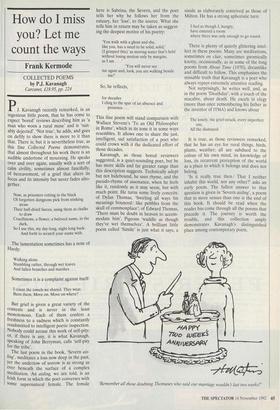How do I miss you? Let me count the ways
Frank Kermode
COLLECTED POEMS by P.J. Kavanagh Carcanet, £18.95, pp. 224 P. . J. Kavanagh recently remarked, in an Ingenious little poem, that he has come to expect 'bored' reviews describing him as 'a man who woos a rural muse' and is 'suit- ably dejected'. 'Not true', he adds, and goes on deftly to show there is more to it than that. There is; but it is nevertheless true, as this fine Collected Poems demonstrates, that almost throughout his work there is an audible undertone of mourning. He speaks over and over again, usually with a sort of calm civility, sometimes almost fancifully, of bereavement, of a grief that alters its focus and its intensity but never fades alto- gether.
Now, as prisoners rotting in the black Of forgotten dungeons pick from stinking straw Their half-dried faeces, using them as chalks to draw Crucifixions, a flower, a beloved name, in the dark, So I use this, my day-long, night-long back- And forth to scratch your name with.
The lamentation sometimes has a note of Hardy:
Walking alone.
Stumbling rather, through wet leaves And fallen branches and marshes .
Sometimes it is a complaint against itself:
I count the towels we shared. They wear. Burn them. Move on. Move on where?
But grief is given a great variety of the contexts and is never in the least monotonous. Each of them confers a freshness to a sadness which is constantly resubmitted to intelligent poetic inspection. Nobody could accuse this work of self-pity; or, if there is any, it is what Kavanagh, speaking of John Berryman, calls 'self-pity for the tribe'.
The last poem in the book, 'Severn ais- ling', meditates a loss now deep in the past, yet the undertow of sorrow is as strong as ever beneath the surface of a complex meditation. An aisling, we are told, is an Irish form in which the poet converses with some supernatural female. The female
here is Sabrina, the Severn, and the poet tells her why he follows her from the estuary, her 'loss', to the source. What she tells him in return may be taken as suggest- ing the deepest motive of his poetry:
'You walk with a ghost and she, like you, has a need to be solid, solid,' (I grasped this) 'as moving water that's held without losing motion only by margins, as I am . . . ' `You will never see me again and, look, you are walking beside me!'
So, he reflects,
for decades I cling to the spar of an absence and presence ...
This fine poem will stand comparison with Wallace Stevens's 'To an Old Philosopher in Rome', which in its tone it in some ways resembles. It allows one to share the just, intelligent, sad satisfaction of a poet who could crown with it the dedicated effort of those decades.
Kavanagh, as those bored reviewers suggested, is a quiet-sounding poet, but he has more skills and far greater range than this description suggests. Technically adept but not hidebound, he uses rhyme, and the pseudo-rhyme of assonance, when he feels like it, randomly as it may seem, but with much point. He turns some lively conceits: of Dylan Thomas, 'Swirling all ways his meanings bounced / like pebbles from the skull of commonplace'; of Edward Thomas, 'There must be doubt in heaven to accom- modate him'. Pigeons 'waddle as though they've wet themselves'. A brilliant little poem called 'Simile' is just what it says, a simile as elaborately contrived as those of Milton. He has a strong aphoristic turn:
I feel as though I, hungry, have entered a room where there was only enough to go round.
There is plenty of quietly glittering intel- lect in these poems. Many are meditations, sometimes en clair, sometimes gnomically knotty, occasionally, as in some of the long poems from About Time (1970), dreamlike and difficult to follow. This emphasises the missable truth that Kavanagh is a poet who always repays extremely attentive reading.
Not surprisingly, he writes well, and, as in the poem `Deathday', with a touch of the macabre, about death. He excels in elegy (more than once remembering his father as the inventor of ITMA) and knows about
The lonely, the grief-struck, every imperfect one, All the dismayed.
It is true, as those reviewers remarked, that he has an eye for rural things, birds, plants, weather; all are subdued to the colour of his own mind, its knowledge of loss, its recurrent perception of the world as a place to which it belongs and does not belong.
'Is it really true then / That I neither inhabit this world, nor any other?' asks an early poem. The fullest answer to that question is given in 'Severn aisling', a poem that in more senses than one is the end of this book. It should be read when the reader has come through all the poems that precede it. The journey is worth the trouble, and this collection amply demonstrates Kavanagh's distinguished place among contemporary poets.
'Remember all those doubting Thomases who said our marriage wouldn't last two weeks?'


































































 Previous page
Previous page